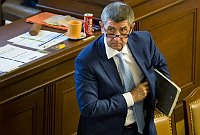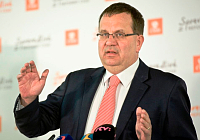Czech finance minister makes about turn on nuclear expansion
CR: Only three months after the Temelin nuclear tender was scrapped, chances that the Czech Republic will swiftly restart preparations to build new reactors have revived with one of the main critics of the former Temelin tender now backing nuclear expansion.
 Andrej Babiš, photo: CTKFinance Minister and leader of the ANO party, Andrej Babiš has publicly come out now in favour of Czech nuclear expansion. He said in an interview with the Czech business weekly Ekonom published on Thursday that the country needed more nuclear power with natural gas not an alternative and that coal reserves should be left in the ground for future generations.
Andrej Babiš, photo: CTKFinance Minister and leader of the ANO party, Andrej Babiš has publicly come out now in favour of Czech nuclear expansion. He said in an interview with the Czech business weekly Ekonom published on Thursday that the country needed more nuclear power with natural gas not an alternative and that coal reserves should be left in the ground for future generations.
Babiš and his party were among the most vociferous opponents of Czech power giant ČEZ’s demands that the state cover a large part of the risks of constructing two new units at its site at Temelin, South Bohemia with guarantees for electricity prices the most frequently raised means of doing this. When the government spelled out that no such guarantees would be on offer, ČEZ said it could no longer keep tender bidders Westinghouse and the Russian-led MIR 1200 consortium hanging on and cancelled the estimated 200 billion crown tender on April 10.
 Temelín nuclear power plant, photo: Filip JandourekAt the time, the government said nuclear expansion was still a priority but the construction deadlines looked like being put back by five to 10 years. Minister of Industry and Trade Jan Mládek, and Babiš have both been mulling how new nuclear reactors might be built with the favoured option increasingly looking like one new bloc and another at Dukovany.
Temelín nuclear power plant, photo: Filip JandourekAt the time, the government said nuclear expansion was still a priority but the construction deadlines looked like being put back by five to 10 years. Minister of Industry and Trade Jan Mládek, and Babiš have both been mulling how new nuclear reactors might be built with the favoured option increasingly looking like one new bloc and another at Dukovany.
Babiš raised the possibility in his latest interview that the two new reactors could be designed as a Public Private Partnership projects. So-called PPPs, where a private investor builds infrastructure and the state or users gradually pay it back, has often been floated as a means to cover the costs of major projects in the Czech Republic, but few such projects have ever got off the ground. He added that another option would be for the expansion to be a joint investment with a private investor with the state investing directly and taking a shareholder stake.
Industry minister Mládek has suggested over recent months that a special state company could be created for the nuclear expansion as a means of circumventing almost 70 percent state controlled ČEZ. ČEZ is handicapped as the main backer of costly long-term projects by the fact that around a third of shares are in private hands and traded on stock exchanges with short term earnings and dividend payments the main focus of their attention.
 Jan Mládek, photo: Filip JandourekBabis also voiced his support for the possibility of South Korean involvement in Czech nuclear expansion, a subject which has been increasingly raised in recent weeks. Czech Prime Minister Bohuslav Sobotka held talks in Prague with South Korea’s foreign minister Yun Byung-Se on Wednesday.
Jan Mládek, photo: Filip JandourekBabis also voiced his support for the possibility of South Korean involvement in Czech nuclear expansion, a subject which has been increasingly raised in recent weeks. Czech Prime Minister Bohuslav Sobotka held talks in Prague with South Korea’s foreign minister Yun Byung-Se on Wednesday.
Czech Television reported Thursday that the opportunities for South Korean participation in the Czech nuclear sector were discussed. The Czech prime minister is due to make an official visit to South Korea though a date has still to be set according to his office.
Chris Johnstone
